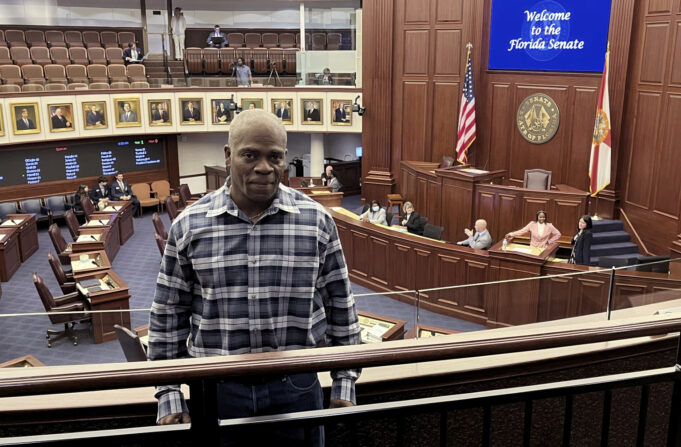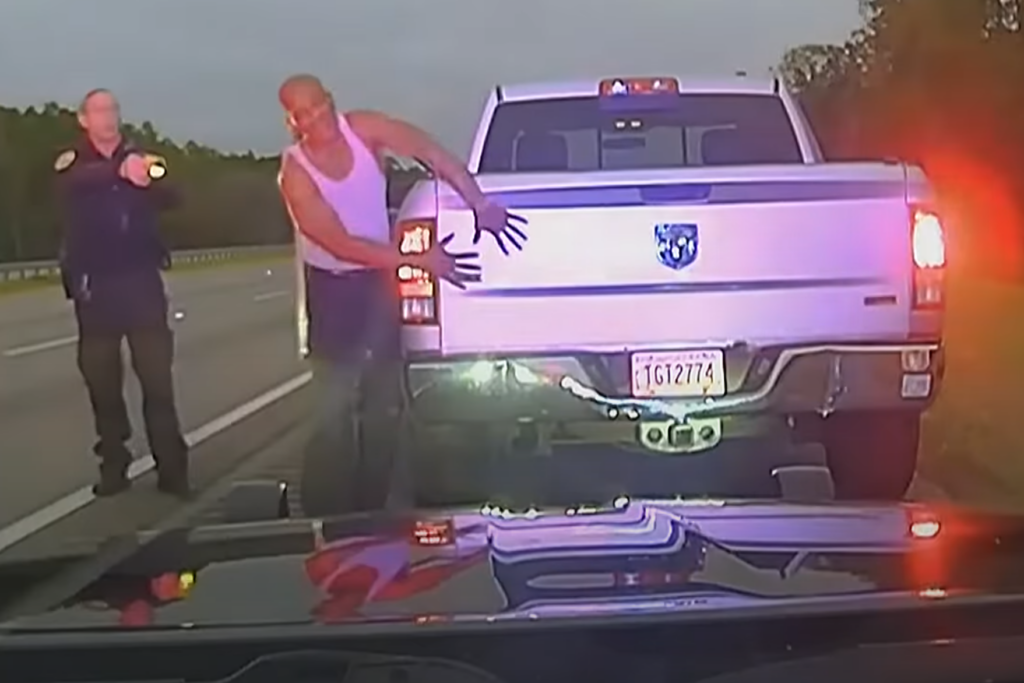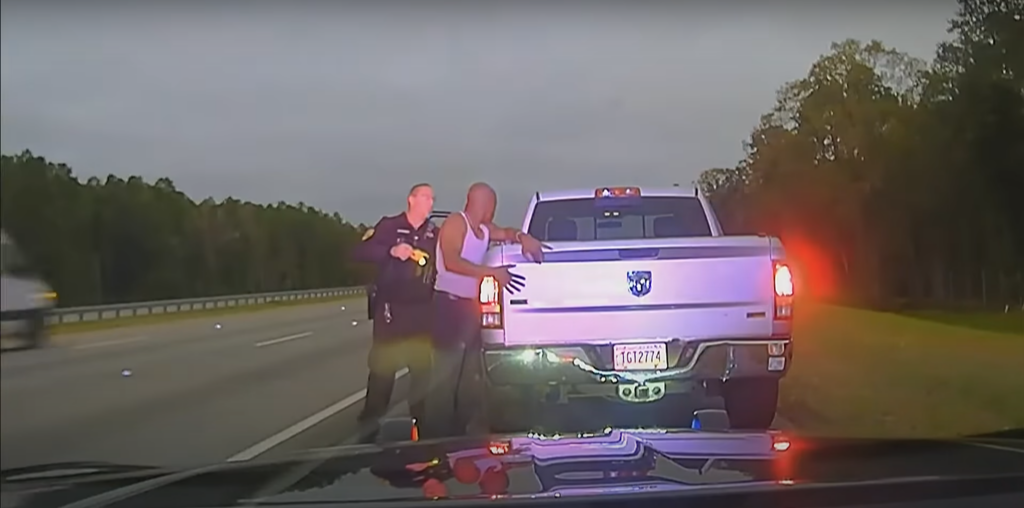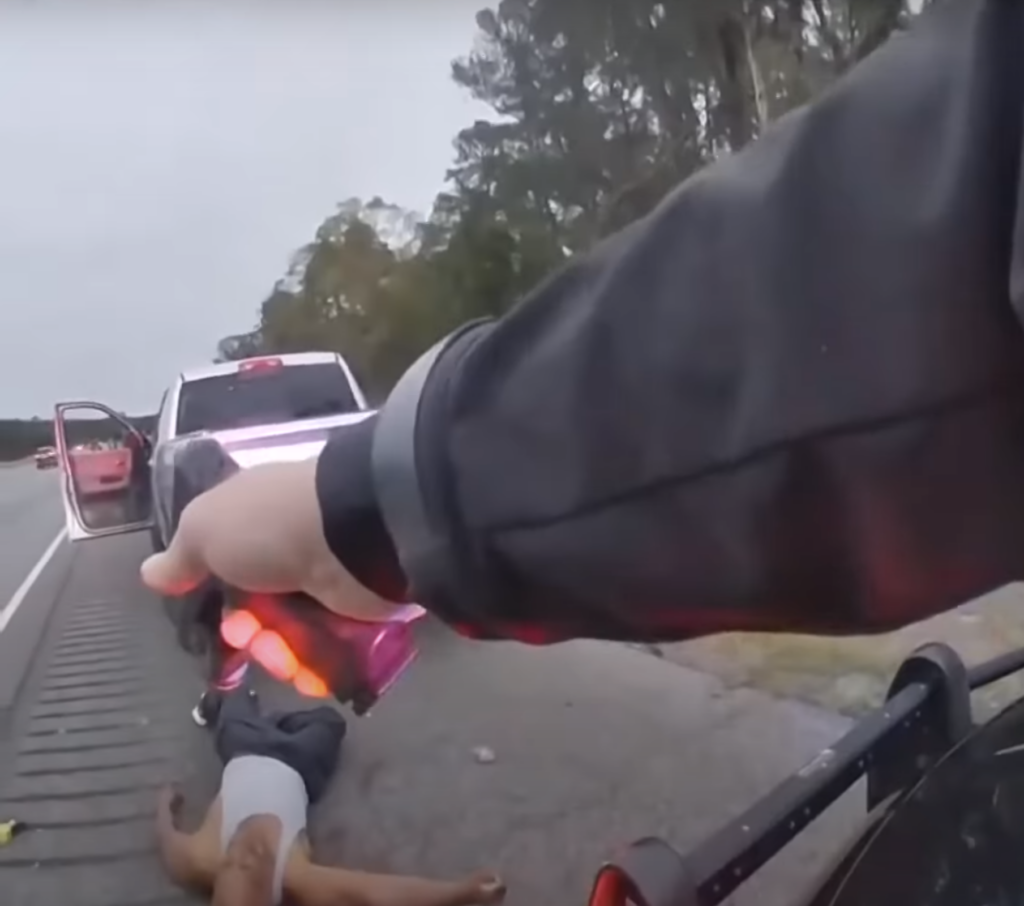ATLANTA—One morning, after fixing breakfast for her son, Mary Cure stood with her hand on her son’s shoulder. She used to always tell him, “You can get it out. You can talk to me.”
“He leaned on me like this, and he just turned his face into my chest and just broke down crying,” Mary Cure recounted during an October 18 press conference. “He said, ‘They took my life. They took it. I was in school, I was working. I was doing fine. I am never going to have a wife and children.’”
Her son, Leonard Allen Cure, a 53-year-old Black man, had just started rebuilding his life after 16 years of imprisonment on a wrongful conviction when a White Camden County, Georgia, sheriff’s deputy fatally shot him on October 16. He was traveling home to Fairburn, Georgia, located in the Atlanta metropolitan area, after visiting his mother in Florida, when the deputy pulled him over for speeding and reckless driving.
“We don’t have any facts, but of course, I’m in agreement with my cousins. We share the same view,” Najma Muhammad, Mr. Cure’s cousin, said to The Final Call.
She described that her cousin kept a positive attitude regardless of what happened and always had a smile on his face. “He always tried to look at the best part of things. Even though he went through that (wrongful conviction), he still had a good attitude and a good spirit. It was like they never broke his spirit,” she said.
Standing for justice
Civil rights attorney Ben Crump and Atty. Seth Miller, the executive director of the Innocence Project of Florida, are representing the family, as the Georgia Bureau of Investigation reviews the shooting. Florida-based attorneys Sue-Ann Robinson and Precious Chavez with Ben Crump Law are also representing the family.
Atty. Crump and Leonard Cure’s family held a press conference on Oct. 18 in Woodbine, Ga. Despite health challenges, Mr. Cure’s mother, Mary Cure, traveled four hours from Port St. Lucie, Florida, which is north of Miami, to Woodbine, to be present. Also present were Mr. Cure’s five siblings and aunt.
“Beside me is his beautiful mother Mary, whose heart is truly broken today, especially after everything that her baby boy has had to endure in fighting against a wrongful conviction of a Jim Crow justice system only to be exonerated and have his life claimed by Jim Crow bigoted policing and their opinion,” Atty. Crump opened the press conference. “She is demanding justice for her son, Leonard Cure.”
Mr. Cure recorded the traffic stop on Facebook Live, but the video was deleted from the social media platform, according to Ms. Muhammad.
“Whoever took down that livestream from Facebook, whether it was law enforcement or whether it was the Facebook company, we think it’s only proper, for transparency, to put that livestream back up on his page so everybody can see what’s going on and what happened in the last moments of Leonard Cure’s life,” Atty. Crump said.
Family members viewed additional footage on Oct. 18, and Camden County, Ga., sheriff’s office has since released body-worn and dash camera videos. The videos open with the deputy’s pursuit of Mr. Cure’s pickup truck.
He pulls over, and the deputy yells at him to “get out” and put his hands up. He tells Mr. Cure to put his hands behind his back “because you’re getting tased.”
“Why am I getting tased?” Mr. Cure asks. “Because you are under arrest for speeding and reckless driving,” the deputy says. After being tased and told he was going to jail, Mr. Cure attempts to fight back. The struggle ends when the deputy fires his gun.
During the press conference, Timothy Bessent Sr., the president of the NAACP Camden County Branch, exposed the wider issues with the county’s law enforcement.
“This is not the first incident and we do understand it won’t be the last. We want the Cure family to know that we are here with you until the end,” he said. “We desire answers. The community desires answers.”
“The climate that’s in Camden County, now: Black and Brown people don’t trust the police. We cannot deny that. We cannot put our head under a rock and act like it does not exist in Camden County. Let’s be clear,” he continued. “It has been so bad in our community with law enforcement, the insurance carrier dropped the county from their insurance, because of so many lawsuits being filed against the law enforcement.”
“It’s like redneck land over there,” Najma Muhammad said. “His sister told me that they still have Klan marches over there.”
Conviction and exoneration
Leonard Cure was convicted in Broward County, Fla., in 2004, for armed robbery with a firearm and aggravated assault with a firearm. He was sentenced to life in prison.
On the early morning of November 10, 2003, in Dania Beach, Fla., a man with a revolver forced his way into a Walgreens store, threatened an employee and left with $1,700 in cash, according to the Innocence Project of Florida’s profile of Mr. Cure, posted on its website.
Two employees, who were also the only witnesses in the case, described their observations to the police and were presented with a lineup of six men.
“Not mentioned in this stage of investigation is that more than one of the six photos in the lineup was of Leonard Cure. Additionally, the ‘suspects’ from the lineup were gathered in a highly unethical way, through combing a law enforcement database of people who had previous interactions with law enforcement,” the profile says.
“They railroaded him from the beginning and then they tampered with evidence,” Ms. Muhammad said.
On the morning of the robbery, Mr. Cure left home with his then-girlfriend, Enid Roman, and her three children. Ms. Roman dropped Mr. Cure off at a bus stop. After exiting the first bus and before catching the second bus on the route he took to work, Mr. Cure stopped by an ATM three miles south of the Walgreens and took out $20, according to the profile. “This places him far from the crime at the same time it occurred,” it says.
When Mr. Cure’s manager reported in for work that morning, Mr. Cure was already there. In fact, Mr. Cure was always on time and always reported to work around 7:00 a.m. each day, according to his manager and a co-worker. Mr. Cure also wore his work attire and not the clothing identified in the incident.
“For (Mr.) Cure to have visited the ATM, robbed the Walgreens, changed clothes, and made it to work on time, he would have had to drive his girlfriend’s car. This was the only considerable theory given by the prosecution, but an implausible one that contradicted both evidence and testimony. Despite the witnesses’ testimony the perpetrator was walking, the prosecution maintained this theory,” the website says.
Mr. Cure and his family maintained his innocence for years, but their cries went unheard. His conviction continued to be upheld, and petitions for post-conviction relief were denied. Finally, after a 2019 request to re-investigate the case, Mr. Cure was released from prison on April 14, 2020, and exonerated on Dec. 14, 2020, due to a collaborative effort by the Conviction Review Unit of the Broward County State Attorney’s Office and the Innocence Project of Florida.
“Sixteen years later, these independent attorneys started their own pursuit to free prisoners who were wrongfully accused of crimes. And then they took his case and they won the case because it was like all the evidence was just there. He was not at the crime. The witnesses said that he was a different complexion. He was at work. So, it was like, he can’t be there and at work at the same time. It was an impossibility, so they released him,” Ms. Muhammad said.
During the Oct. 18 press conference, Atty. Crump brought up a quote from his grandmother: “What’s worse than a lie? That is telling the truth and having nobody believe you.”
Mr. Cure’s wrongful conviction caused him severe psychological trauma, according to family and attorneys.
“(At) the time he was incarcerated, wrongfully accused, he was engaged. He had just started his new job and he was excited about his new life, and then that was taken from him,” Ms. Muhammad said.
At the press conference, Mary Cure recounted how her son was assaulted and stabbed during his time in prison, and she would receive little to no information. “Frequently I was told, ‘Leonard is an adult.’ I said, ‘He’s my son. I have a right to know if he’s OK’” she said. “I went to prison so many times because my son suffered from so much abuse. The first time that he was ever in confinement, he went because he was praying. They locked him up because he was praying.”
Ms. Muhammad noted that her uncle joined the Nation of Islam in the ‘60s, and his children were all born in the Nation. Mr. Cure had a Jewish tattoo on his arm, along with a circle with the Hebrew name for God, “Yahweh.”
“He was a faithful believer, and they hated that. But he will never ever recant his religion. He was never going to deny that. He was not going to compromise himself and say, ‘I did that,’ to walk free,” Mary Cure said. “That is not how I raised my eight children. I raised them alone. They’re smart. They went to school. I graduated from college. We were all in school together. And I taught them as best I could. We didn’t come from a wealthy background, but we chose to live with integrity.”
Mr. Cure was granted $817,000 in compensation in July, along with educational benefits. He had just received the money two months ago, in August, and had just closed on a home in Atlanta. He was holding down a steady job and was also looking forward to getting a college degree in music production.
“He didn’t even get a chance to really start his life. He was just beginning to start his life again, and now this happened,” Najma Muhammad said. “It’s just unfortunate because he didn’t have any legacy. He never got a chance to get married. He never had children. So, it’s like, he didn’t have a legacy in reference to anyone that he left behind.”
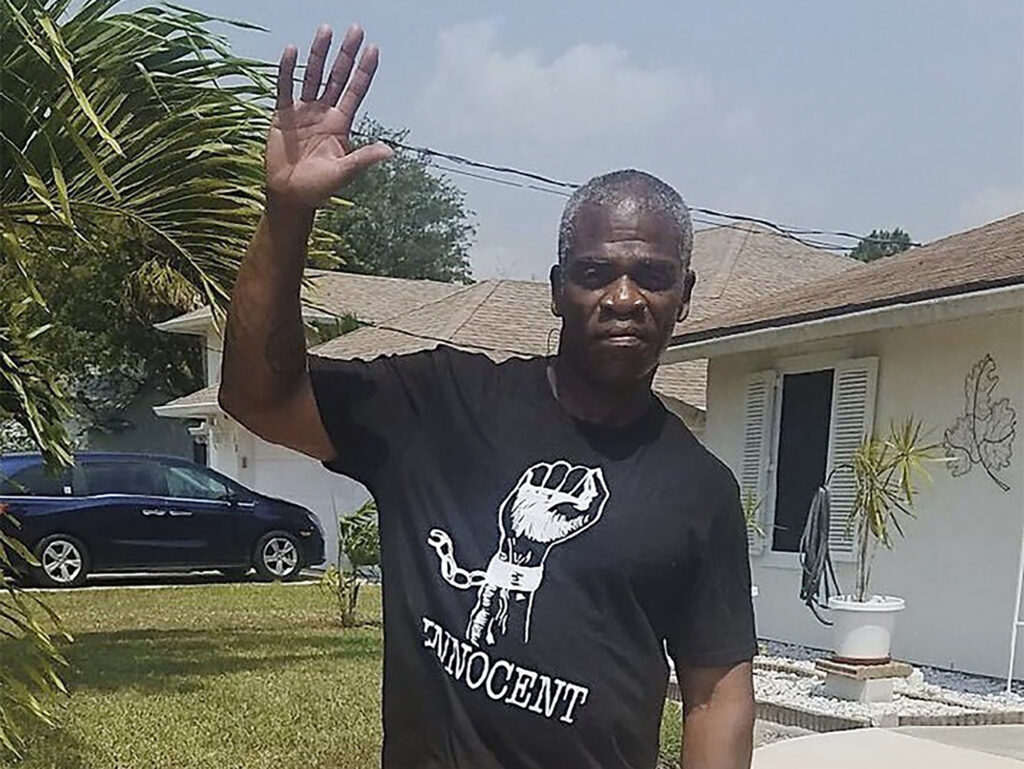
“He is someone that was failed by the system once, and he has again been failed by the system. He’s been twice taken away from his family,” Atty. Seth Miller said, during the press conference.
He and his team built a relationship with Mr. Cure, as they helped him reintegrate back into society.
“He, like many of my other clients, their biggest fear is that at a moment’s notice, there’s going to be law enforcement on the other side of that front door or at a traffic stop who is going to … send them back right where they worked so hard to get out of. And I can only imagine that must have been what he was thinking during this traffic stop,” Atty. Miller said.
Leonard’s life matters
Michael Cure described his brother, Leonard Cure, as an exceptional individual. “He did not harm anyone. In fact, after being wrongfully convicted for 16 years, you know what he did? He forgave the idiots that locked him up. That is what he did. That is how forgiving he was. I’m not that forgiving,” he said at the press conference. “He was charismatic, extremely intelligent, and he was a man of integrity, if nothing else. My brother mattered to us.”
“We never abandoned him or turned our backs on him. We stuck with him throughout this ordeal. And that is exactly what it was, an ordeal that I, along with my family and my mother, had to endure,” Michael Cure continued. “So yes, he was locked away, but so were we, because we loved him. Seveenteen years and no Christmases with him, no Thanksgivings with him, no birthdays with him, thanks to this injustice in this country.”
Leonard Cure was a gentle and loving person, Wallace Cure said of his brother.
Atty. Miller described Mr. Cure as a great guy and as a friend and family member of the Innocence Project.
“The Leonard I knew was a good person, a person of goodwill, who would call me to ask me questions about how my life was. I’m fine, but he was always checking in on me,” he said. “He was a good person who deserved to get home on Monday. He deserved to get home safely on Monday. His life mattered. Leonard’s life mattered.”
The family may be seeking an independent autopsy, according to Atty. Crump.
The unnamed deputy has been placed on administrative leave. The Georgia Bureau of Investigation will send its findings to Brunswick Judicial Circuit District Attorney Keith Higgins, who will determine whether to seek charges, according to The Associated Press.












